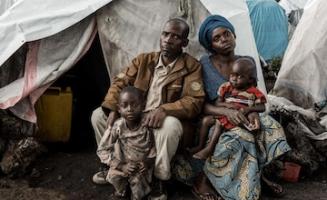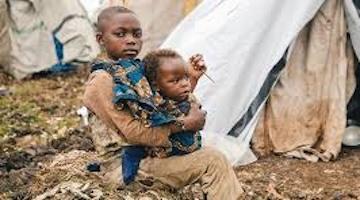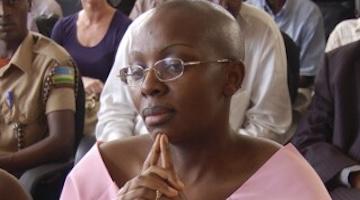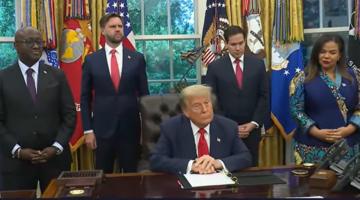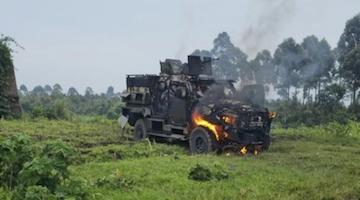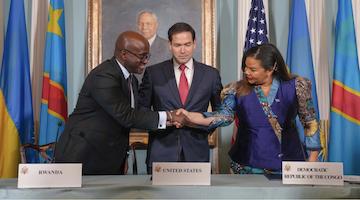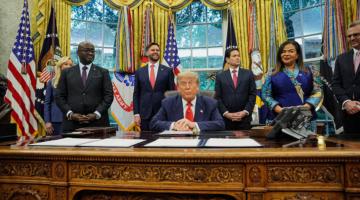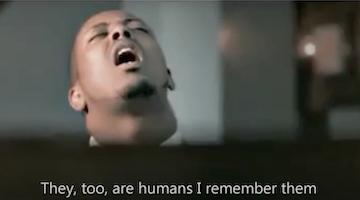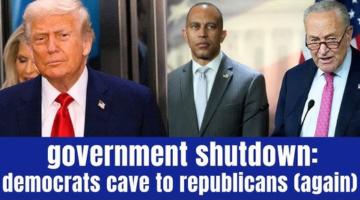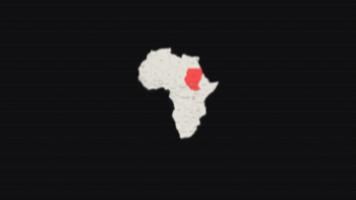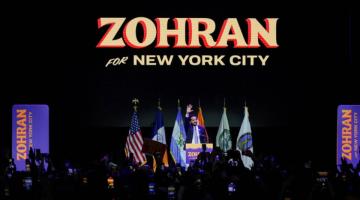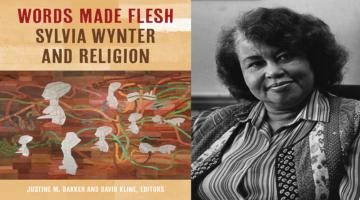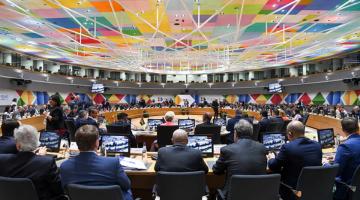More than 6 million Congolese now shelter in IDP camps.
The ongoing crisis is a result of converging forces determined to pursue their own interests by controlling the affairs within the Congo and subjecting the masses to inhumane conditions.
The constellation of events unfolding around the Democratic Republic of the Congo (DRC) demands a clarifying and edifying update to capture the essence of developments in the heart of the African continent. As a reminder, the DRC is a country the size of Western Europe, straddling the equator and, unlike any other African nation, is bordered by nine other countries. It is the second-largest country on the continent in terms of area and the fourth-largest in terms of population, with an estimated 100 million inhabitants. It is a part of the second largest rainforest on the planet and vital in the fight against the climate emergency. In addition, the DRC is the largest producer of cobalt in the world with 70% of the world's production, making it crucial to the green energy transition. Cobalt is a key ingredient in the production of rechargeable batteries.
This giant of a country in the heart of the African continent is facing three immediate challenges:
1. Presidential and Parliamentary Elections - The DRC will hold presidential and parliamentary elections on December 20th. The incumbent president, Felix Tshisekedi of the Union for Democracy and Social Progress (UDPS) party and Sacred Union coalition will face off against twenty-three would-be hopefuls. His main challengers, however, are Moise Katumbi, of Together for the Republic party (Ensemble Pour Le Congo in French), likely his most formidable foe; Martin Fayulu, of Engagement for Citizenship and Development party (ECIDE), the candidate who actually won the last time presidential elections were held in 2018, but who was denied the presidency due to a deal between Felix Tshisekedi and the outgoing president at the time, Joseph Kabila, in an arrangement backed by the United States. The third main challenger is Nobel Peace Prize Laureate and human rights activist, Dr. Denis Mukwege who is running as an independent. Although the challengers exhibit varying concerns for the interests of the Congolese people, much like the incumbent Tshisekedi, none of them represents progressive politics and certainly none is anti-imperialist. Even among the new youthful entries issued from youth movements that some may classify as Pan Africanist in nature, they too are firmly ensconced in the camp of the imperialists and in many respects are supported by the usual “pro-democracy” entities emanating from the U.S. government.
The usual challenges from the previous three post-war elections in 2006, 2011, and 2018, remain the same i.e. chaotic, problematic voter rolls, and the electoral commission, constitutional courts, and security apparatus firmly in the hands of the incumbent. This raises the question about not what the outcome will be but rather who will be announced as the winner, which may or may not be consistent with the will of the people. One of the major opposition candidates, Martin Fayulu captured the essence of the opposition's concerns in an opinion piece on Al Jazeera when he stated that:
"He [Tshisekedi] has appointed judges unconstitutionally; handpicked partisan members of the supposedly independent electoral commission (CENI); imposed or otherwise failed to reform unfair electoral laws that are favourable only to him; and declared a “state of siege” – which amounts to martial law – in North Kivu and Ituri provinces, areas known to be opposition strongholds."
The Congolese Conference Bishops Conference (CENCO) has outlined a list of concerns that is says threatens a free and fair elections including but not limited to lack of credible audit of the voter's roll, repression of opposition candidates, and a state of siege and disenfranchisement of large segments of the population in the east of the country due to the conflict.
Despite the advantages held by the incumbent, Felix Tshisekedi, the outcome is still a question mark, however, what is predictable is that the elections will be chaotic and disputed irrespective of who is named the victor.
2. The second major area of concern as we near the end of the year and as elections approach in the DRC, is the latest manifestation of Rwanda's 25-year war of aggression and plunder against the Congo. Since November 2021, the Rwandan government in particular, and to some extent the Ugandan government has resuscitated the M23 who were defeated in 2013 and retreated to Rwanda and Uganda where they were dormant. The M23 is the latest rebranded Rwanda-backed militia destabilizing eastern Congo since Rwanda was forced to give up its occupation of large swaths of the country in 2002. Before the M23 acquired its new name in 2012, they were known as the National Congress For the Defense of the People (CNDP in French), which was established in 2006. CNDP emanated from a number of the branches of the Rally for Congolese Democracy (RCD) formed in the late 1990s following Rwanda’s two invasions of the Congo in 1996 and 1998. The M23 is now back, better armed than before, and embedded with Rwandan soldiers who are terrorizing eastern DRC. They have occupied key territories bordering Rwanda and Uganda which has exacerbated the millions of Congolese who are internally displaced.
There were concerns about the M23 attempting to capture Goma, the largest city in the east with about 2 million inhabitants, and possibly advancing into South Kivu. However, according to reports emanating from Washington, the Biden Administration has intervened to avoid an all-out war between DRC and Rwanda. Unlike President Obama who withheld military aid from Rwanda for backing the M23, the Biden Administration has taken a different approach. It has sought to shepherd a process that would result in Rwanda's Paul Kagame and D.R. Congo's Felix Tshisekedi making compromises to arrive at a detente between the two nations. The essence of the deal being brokered by Washington is that both sides would cease arming militia groups in the east of the Congo.
Rwanda has long used the Rwandan militia group, the Democratic Forces for the Liberation of Rwanda (FDLR in French) as an excuse for sending its soldiers into the Congo. Some members of the FDLR participated in the 1994 genocide. However, as long ago as 2008, the United Nations debunked the notion that the FDLR represented an existential threat to the Rwandan state. A recent Africa confidential report identifies key strategic and economic imperatives for Rwanda's recent resuscitation of the defunct M23. They include: Access and control of minerals such as coltan, tin, and gold; rising export earnings from the sale of Congo’s gold as a reason for international confidence in its bond offerings; and control of road and trade networks. A new regional road being built by Uganda and Congo threatens to cut Rwanda out of lucrative regional trade between the port city of Mombasa and Congo.
Both Rwanda and Uganda have benefitted from Congo’s riches since their invasions of 1996 and 1998. The United Nations published a series of reports from 2001 – 02 in which they dubbed Paul Kagame of Rwanda and Yoweri Museveni of Uganda as the Godfathers of the illicit minerals trade in the Congo. In fact, the militaries of Rwanda and Uganda fought each other on Congolese soil from June 5 – 10, 2000, in the so-called Six-Day War in Kisangani, DRC ostensibly over control of minerals in the area.
Unlike the post-independence Pan Africanists who rallied to the side of the Congo in an attempt to strengthen the country for the benefit of Africa writ-large, today’s agents of neo-colonialism such as Paul Kagame and Yoweri Museveni have plundered the riches of the country for their own personal benefit at the expense of the Congolese people in particular and Africa at-large.
3. The third challenge is the scramble for control and influence over Congo's critical minerals, which are vital to the clean energy transition and the move from the combustion engine to electric vehicles. Reports coming out of the United States posit that China has captured Congo’s cobalt market to the exclusion of the U.S. and other Western countries. The claim is dubious for a host of reasons but chief among them is the fact that the U.S. company, Freeport McMoran owned one of the largest copper concessions, Tenke Fungurume, in the world. However, in order to retire its debt, Freeport sold its concession to the Chinese company, China Molybdenum. The New York Times reported that President Biden’s son, Hunter Biden was part of the negotiations of the sale of the concession to the Chinese. The United States signed a Memorandum of Understanding with the DRC and Zambia that would ultimately construct an electric vehicle battery supply chain in the region with U.S. support. However, the MOU does not have any concrete deliverables in terms of investment. The other MOU signed by the United States, Zambia, DR Congo, Angola, the European Union, and The African Development Bank and African Finance Corporation to develop the Lobito Corridor and the new Zambia-Lobito rail line, ostensibly to establish a route to get critical minerals out of the Congo to the Atlantic, is far more substantial and concrete.
The U.S. Congress has also entered the fray with two Congressional Bills being initiated by Congress members Chris Smith of New Jersey and John James of Michigan. Both men sponsored bills to combat China’s influence and control of cobalt in the Congo and called upon the U.S. to increase its presence and access to critical minerals in the country. Washington-based think tanks have begun producing a bevy of research about the importance of Congo’s and Africa’s minerals to the future of green energy industries in the United States and Europe.
As China, the U.S., and other countries vie for Congo’s minerals, a key constant since the era of King Leopold II in the late 1800s, is that Congolese continue to pay a harsh price for the pursuit of its wealth, of which the people are not the primary beneficiaries. A startling fact is that up to 70 million of Congo’s 100,000 million inhabitants live on less than $2.15 per day meanwhile, sanctioned individuals such as Dan Gertler earn $200,000 dollars a day in royalties from Congo’s mineral wealth. The Biden Administration is reported to be considering removing Dan Gertler from the sanctions list to free him up to continue plundering the Congo with impunity.
The ultimate pursuit of progressive forces in the Congo is to control and determine the affairs of the Congo. Patrice Lumumba gave his life so that the sons and daughters of the Congo would ultimately take ownership of the country’s wealth for their benefit and for the benefit of Africa overall. That mission is as relevant today as it was a half-century ago, which makes the global movement around a free and liberated Congo as important now as the Free South Africa movement was yesterday. #FREECONGO www.freecongo.org
Maurice Carney is the Executive Director of Friends of the Cong

